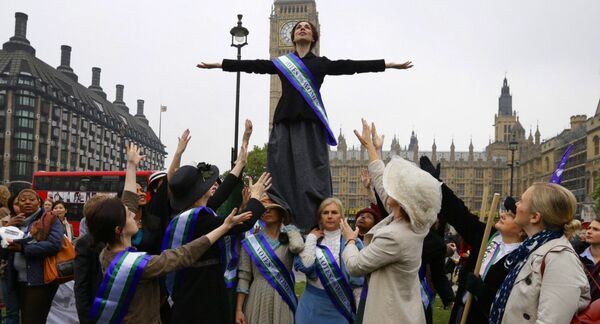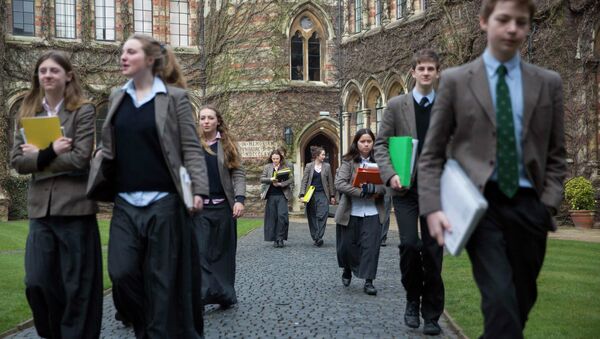A politics and media literacy organisation has warned on Friday that the Department for Education's (DfE) new guidelines for English schools could inhibit education and sets a precedent that undermines teaching confidence.
Last Thursday, the DfE said in its new sex and relationship education guidance schools should not "under any circumstances use resources produced by organisations that take extreme political stances on matters" and included the stated desire to overthrow capitalism as an example.
Shout Out UK, which works with young people to "protect and amplify democracy by ensuring Political Literacy education is as widespread as possible", said that the DfE excluding anti-capitalist material from the classroom could dissuade teachers from providing adequate ideological discussion in schools.

Communications Officer Ellie Fishleigh said that teachers have "raised their concerns" in the form of a direct open letter supported by the "political education and democracy promotion sectors" on Thursday.
"We are aware that this guidance is non-statutory implementation guidance for the RSE curriculum but we are concerned about the fact that teachers aren't necessarily going to perceive it like that, they're going to be worried about the fact that they can't use anything political and risk breaking the guidelines by even mentioning socialist ideas", she said.
"Teachers are going to be worried about the fact that they can't host the breadth of debate that they might have otherwise because they're worried that this is the approach the government is taking."
While guidelines being non-statutory means they are based on internal customs and precedent as opposed to legislation passed through parliament, concerns over teachers withholding from teaching certain material are still being raised.
Fishleigh explained that Shout Out are advocating for students to be able to "engage with ideas, including anti-capitalist ideas, head on" and that attempting to ban schools from using materials is counterproductive, as they will encounter the material outside the school setting regardless.
"The guidance could be interpreted in such a way that you wouldn't be allowed to use material produced by, for example, civil rights movements when you're educating students about civil rights if that organisation had factions that call for radical overthrow of democracy or a change to the capitalist system."
"We are concerned that people could interpret this guidance so that they don't use material from importance organisations and figures in fear of breaking the rules", she said.
Citing "historically important organisations like the Suffragetes, like the Civil Rights movement", which could break the new rules if taught despite their importance to curriculum, she cautioned that the guidelines "extreme" designation becomes hard to interpret.
When asked about the guidelines' inclusion of anti-capitalism alongside racism as extreme ideas, she said that the two cannot be compared.
"Debating capitalism is an ideological debate and a perfectly valid discussion to have, where as anti-semitism and racism are baseless forms of discrimination."
She said that it does "suggest that the government isn't interested" in highlighting the discussion surrounding capitalism but highlighted incompetence as the primary reason as opposed to an ideological crusade from the state.
"I don't think there is a goal here to consolidate the capitalist system", she said.
She did warn, however, that if the guidance were to be "extended to other sectors of the curriculum, particularly history or PSHE" then that would be "very clearly be an attempt to mute debate around capitalism".
"We are writing this on behalf of teachers to give them the clarity they need because we don't understand teachers to be achieving political goals in their work. They simply want to do their job", she added.
In response to a question about whether it would be possible to pressure the government into potentially changing the guidelines, she stressed that the current aim was to receive clarity from the government.
"We've seen a lot of U-Turns as of late in the United Kingdom, so it's not off the cards. We are asking for the government to clarify what they mean by this and how it should be interpreted."
A Democratic Pushback
Shout Out UK expressed concerns in their open letter yesterday to Education Secretary Gavin Williamson over the "precedent" the move to ban anti-capitalist material sets for the curriculum as a whole, and the potential "impact on teachers’ confidence to cover political topics".
The letter received support from 31 signatories including pro-democracy and education organisations such as the Sortition Foundation, Unite to Reform, and The Politics Project, The Economist Educational Foundation, as well as a number of academics from UK universities.
Citing the organisation's directive of "widening access to education about political issues", the letter implored the government to consider the regulation "has the potential to censor the already minimal discussion of politics in schools".
"The guidelines serve to deny students the opportunity to engage with material from ‘extreme’ sources in a classroom environment, precluding informed debate and discouraging critical thinking", the address said.
"Political education continues to be either inadequate or completely absent for most students in the UK; we want to ensure that any window of opportunity to discuss politics is as wide as possible."
The network asked for "urgent clarification" from the Department of Education over regarding schools facilitating "a sufficiently diverse dialogue on topics within the RSE curriculum" without limiting for fear of breaching the guidelines, that the rules would not extend to other subjects such as Arts, Humanities and Social Sciences, and whether schools can continue to work with "education providers who embrace open dialogue and diversity of thought to achieve a nuanced approach to complex social and political topics".
The letter reiterates that students require "the Political and Media Literacy skills to ensure that they can understand and discuss political issues with a critical mindset".
"‘Extreme’ political organisations will exist whether or not schools are allowed to discuss them in the classroom, but this guidance deprives students of the chance to tackle them head-on. Politics necessitates dialogue and the continual contestation of ideas. Schools should be a safe place for this to happen without fear of recrimination or censorship", the letter said.
We are leading a coalition of organisations from the political education and democracy promotion sectors in response to the @educationgovuk 'anti-capitalist' guidelines concerning the censorship of ‘extreme’ political content in schools #PoliticalLiteracyhttps://t.co/uNdfa79Gi1 pic.twitter.com/F2kXMtMWZk
— Shout Out UK (@Shoutout_UK) September 30, 2020
Legal Trouble?
The new government is also facing a legal challenge from campaign groups alleging that the new DfE guidelines could inhibit education about anti-racism.
In a pre-action letter, the Coalition of Anti-Racist Educators (Care) and Black Educators Alliance (BEA) say that the rules discourage the use of material produced by any "campaigning organisation that seeks to draw attention to the disproportionate impact of state violence (including against Black men)" such as Black Lives Matter, Extinction Rebellion, or the charity Inquest.
Coalition of Anti-Racist Educators (CARE) and Black Educators Alliance (BEA) are taking legal action on defending the classroom against the Department for Education’s attempt to ban learning linked to anti-capitalism. Learn more and support them here: https://t.co/djIi6cy755
— #BlackLivesMatterUK (@ukblm) October 1, 2020
The letter also highlights that the vague use of "victim narratives" could be used to dissuade teachers from using material produced by organisations that campaign for minority rights.
Both groups Care and the BEA have begun fundraising to begin a judicial review unless the government withdraws the new guidelines.



